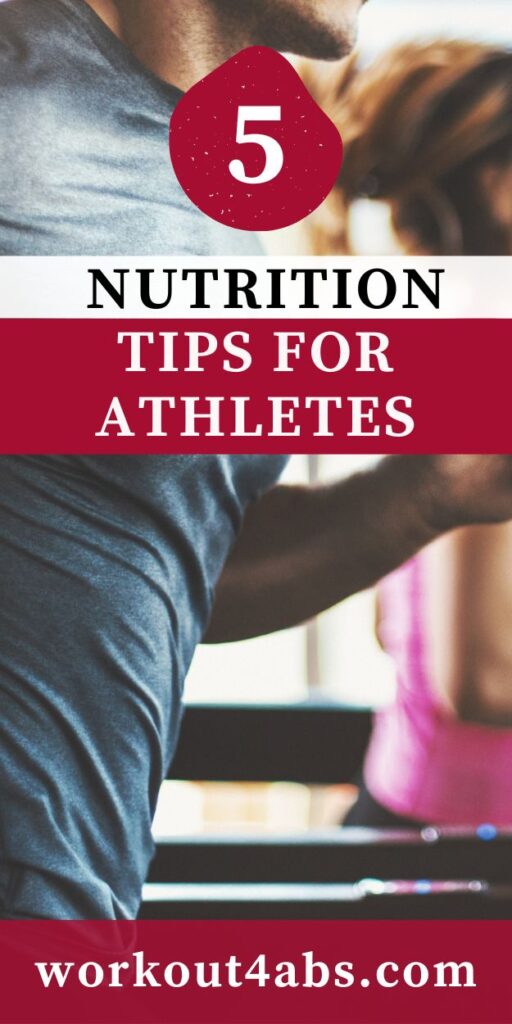Are you ready for an athlete diet plan for peak athletic performance? Explore essential nutrition tips tailored to athletes, offering insights into fueling workouts, optimizing recovery, and sustaining long-term health. Discover the keys to unlocking your full athletic potential through the power of a well-balanced diet.
How Should Athletes Diet? | Sports Nutrition Tips For Athletes
If you enjoyed these tips, please save this pin to your Pinterest Board.

Calories in Calories Out for Athletes
“Calories in, calories out” (CICO) is a fundamental concept in sports nutrition and overall fitness that pertains to the balance between the energy you consume through food and beverages (calories in) and the energy you expend through physical activity and metabolic processes (calories out). This concept is essential when it comes to improving athletic performance. Here’s how it works:
- Calories In (Consumed Calories): This represents the energy you obtain from the food and drinks you consume. These calories come from macronutrients like carbohydrates, proteins, and fats, as well as micronutrients like vitamins and minerals. The goal with calories in for athletes is to ensure you’re consuming enough energy to support your training and performance needs. Athletes often need more calories than sedentary individuals to fuel their workouts and recover effectively.
- Macronutrients: Carbohydrates are a primary source of energy for athletes, particularly during high-intensity activities. Proteins support muscle repair and growth, while fats provide a sustained source of energy during longer-duration activities.
- Calories Out (Expended Calories): Calories out represents the total energy your body expends throughout the day. It includes:
- Basal Metabolic Rate (BMR): The energy your body requires at rest to maintain essential functions like breathing, digestion, and cell repair. BMR is influenced by factors such as age, gender, and lean muscle mass.
- Thermic Effect of Food (TEF): The energy expended during the digestion, absorption, and metabolism of the food you eat. Different macronutrients have varying thermic effects, with protein having the highest.
- Physical Activity: The energy expended during exercise and physical activity. This includes both planned workouts and daily activities like walking, standing, and climbing stairs.
- Thermoregulation: The energy used to maintain body temperature, which can increase during exercise, especially in hot or cold conditions.
- Recovery and Muscle Repair: Energy used for repairing and building muscle tissue after exercise.
Improving athletic performance through CICO involves striking the right balance between calories in and calories out. Here’s how it applies:
- Energy Availability: Athletes need to ensure they have enough energy available (calories in) to support their training and performance goals. Consuming an appropriate amount of carbohydrates, proteins, and fats is essential for providing the energy required for workouts, recovery, and overall athletic performance.
- Nutrient Timing: Timing your nutrient intake can impact performance. Consuming carbohydrates before and during exercise can provide readily available energy, while post-workout protein intake supports muscle recovery and repair.
- Hydration: Staying adequately hydrated is a crucial aspect of CICO for athletes. Dehydration can negatively affect performance, so athletes should monitor their fluid intake to match their sweat losses during exercise.
- Individualized Needs: Athletes have unique calorie and nutrient requirements based on factors like sport type, intensity, training volume, and body composition. Individualized nutrition plans are often necessary to optimize performance and achieve specific goals.
- Periodization: Nutrition should be adapted to training cycles. During periods of intense training or competition, athletes may need to increase their caloric intake to meet higher energy demands. Conversely, during rest or recovery phases, they may adjust their intake to maintain or lose weight as needed.
It’s important to note that while energy balance is a fundamental consideration, other factors, such as the quality of the calories consumed, micronutrient intake, and meal timing, also play significant roles in optimizing athletic performance. Athletes often work with sports dietitians or nutrition experts to create personalized nutrition plans that align with their specific goals and training needs.
Nutrient Dense Foods for Athletes
Nutrient-dense foods are incredibly important for athletes because they provide a high concentration of essential nutrients relative to their calorie content. These foods offer a wide range of vitamins, minerals, antioxidants, fiber, and macronutrients (carbohydrates, proteins, and fats) that are crucial for optimal athletic performance and overall health. Here’s why nutrient-dense foods are so vital for athletes:
- Optimal Energy Levels: Nutrient-dense foods supply athletes with the energy they need for training and competition. Carbohydrates, a key energy source, are abundant in nutrient-dense foods like whole grains, fruits, and vegetables. Athletes rely on these carbohydrates to fuel their workouts and maintain consistent energy levels.
- Muscle Repair and Growth: Protein is essential for muscle repair and growth. Nutrient-dense sources of protein, such as lean meats, poultry, fish, dairy products, beans, and legumes, provide the amino acids needed to repair muscle tissue damaged during exercise and support muscle development.
- Immune Function: Adequate intake of vitamins and minerals, especially vitamins C and D, zinc, and iron, is vital for maintaining a robust immune system. Athletes who engage in intense training are at risk of immune system suppression, and nutrient-dense foods can help mitigate this risk.
- Antioxidants and Anti-Inflammatory Compounds: Nutrient-dense foods are rich in antioxidants and anti-inflammatory compounds like vitamins A, C, E, and phytonutrients (e.g., flavonoids and carotenoids). These substances help combat oxidative stress and inflammation caused by strenuous exercise, supporting faster recovery and reduced muscle soreness.
- Digestive Health: Fiber, found in foods like fruits, vegetables, whole grains, and legumes, aids in digestive health. Athletes benefit from healthy digestion as it ensures the efficient absorption of nutrients and helps prevent gastrointestinal distress during exercise.
- Sustained Energy: Nutrient-dense foods provide slow-digesting carbohydrates and fats that promote sustained energy release, ideal for endurance athletes who engage in long-duration activities.
- Hydration and Electrolyte Balance: Many nutrient-dense foods, such as fruits and vegetables, are rich in water and electrolytes (e.g., potassium, magnesium). These help athletes stay hydrated and maintain electrolyte balance, crucial for optimal muscle function and performance.
- Bone Health: Adequate calcium and vitamin D intake is vital for maintaining strong bones. Nutrient-dense dairy products, fortified foods, and leafy green vegetables are excellent sources of these nutrients, which help prevent stress fractures and support overall bone health in athletes.
- Weight Management: Nutrient-dense foods can assist with weight management by providing satiety and reducing the likelihood of overeating empty-calorie foods. Athletes often need to maintain specific weight categories for their sports, making the quality of calories consumed important.
- Long-Term Health: In addition to immediate athletic performance, nutrient-dense foods contribute to overall long-term health. A diet rich in these foods can reduce the risk of chronic diseases such as heart disease, diabetes, and certain cancers, ensuring athletes have a strong foundation for a lifetime of physical activity.
In summary, nutrient-dense foods are essential for athletes because they provide the necessary nutrients to support energy production, muscle function, recovery, immune health, and overall well-being. Athletes should prioritize these foods in their diets to optimize their performance and ensure they can meet the demands of their training and competition while maintaining long-term health.
If you enjoyed these tips, please save this pin to your Pinterest Board.

Stress, Exercise, and Sleep Influences on Food Choices Made by Athletes
The choices athletes make about their food and nutrition are influenced by a variety of factors, including sleep, exercise, and stress levels. These factors can impact an athlete’s dietary preferences and habits in significant ways:
- Sleep:
- Appetite Regulation: Sleep plays a crucial role in regulating hormones that control appetite, such as leptin and ghrelin. Poor sleep can disrupt these hormones, leading to increased cravings for high-calorie, carbohydrate-rich foods. Athletes who don’t get enough sleep may be more prone to making less nutritious food choices.
- Energy Balance: Inadequate sleep can result in fatigue and reduced energy levels. Athletes may compensate for this fatigue by consuming more calories, especially from sugary or caffeinated foods and drinks, to stay awake and alert.
- Late-Night Eating: Irregular sleep patterns or late-night training sessions can lead to late-night eating, which often involves less nutritious snack choices. Athletes may reach for convenient, calorie-dense snacks that can disrupt their overall dietary patterns.
- Exercise:
- Energy Expenditure: The type, intensity, and duration of exercise influence an athlete’s calorie needs. Those engaged in high-intensity or endurance sports require more calories to support their training and recovery. Consequently, they may be more inclined to consume larger portions or energy-dense foods.
- Carbohydrate Needs: Athletes involved in endurance activities have higher carbohydrate requirements to fuel their workouts. This can lead to a preference for carbohydrate-rich foods, such as pasta, rice, and energy gels, to meet these needs.
- Protein Intake: Athletes engaged in strength training or muscle-building exercises often prioritize protein-rich foods to support muscle repair and growth.
- Stress Levels:
- Stress Eating: Stress can trigger emotional eating in athletes, leading to cravings for comfort foods that are typically high in sugars, fats, and calories. Stress-related eating can disrupt an athlete’s usual dietary patterns.
- Coping Mechanism: Some athletes use food as a coping mechanism to deal with stress. Stress-induced emotional eating may lead to the consumption of less nutritious foods, which can negatively impact overall health and performance.
- Nutrient Absorption: Chronic stress can affect nutrient absorption and digestion, potentially reducing the body’s ability to utilize nutrients from food optimally.
It’s important to recognize the interplay of these factors and their potential impact on an athlete’s food choices. To promote healthy eating habits and optimize performance, athletes can take the following steps:
- Prioritize Sleep: Establishing consistent sleep patterns and prioritizing quality sleep is essential for appetite regulation and overall well-being.
- Plan Nutrition: Plan meals and snacks strategically around training sessions and competitions to meet energy needs and optimize recovery.
- Manage Stress: Implement stress management techniques such as mindfulness, meditation, or yoga to reduce emotional eating triggers.
- Seek Professional Guidance: Athletes can work with sports dietitians or nutrition experts to develop personalized nutrition plans that account for their specific needs and circumstances.
- Mindful Eating: Practice mindful eating by paying attention to hunger and fullness cues rather than relying on emotional or stress-related triggers.
In summary, sleep, exercise, and stress levels can significantly influence an athlete’s food choices. Being aware of these influences and taking steps to manage them can help athletes make more informed and balanced dietary decisions that support their performance and overall health goals.
If you enjoyed these tips on an athlete diet plan and would like to keep it close to you at any time, just save this pin to your Pinterest Board.

Home › Workout for Athletes ›Athlete Diet Plan